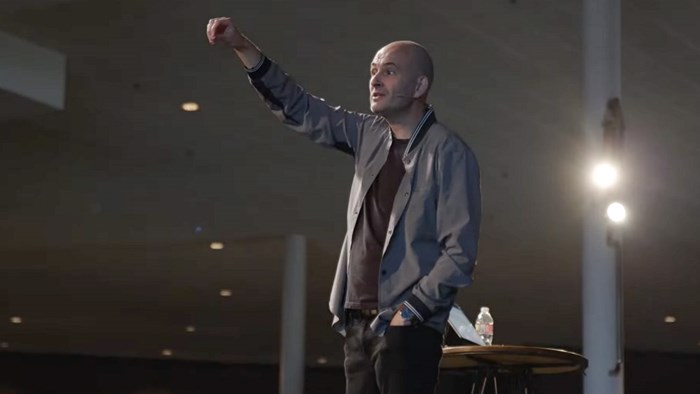
The “mother church” of the Vineyard movement announced Sunday that it is disassociating from the charismatic denomination.
The division isn’t theological, pastor Alan Scott told Vineyard Anaheim, the California congregation he and his wife, Kathryn, have led for four years. There aren’t any big disputes over the direction of Vineyard USA. No personal grievances causing a rift.
It’s just that the leaders of Vineyard Anaheim believe that God is guiding them to leave the denomination their church helped start. So they are leaving.
“We don’t really understand why,” Alan Scott said in a recording of a Sunday service obtained by CT. “I wish I really could sit before you today and say, ‘Here are the six reasons,’ ‘Here’s our issues,’ ‘Here are our grievances,’ or whatever. … We don’t always know what’s on the other side of obedience.”
A spokesperson for the church declined to speak to CT and pointed to an official statement posted on its website. The statement says the decision is “our best effort to respond to the distinct calling on our church at this time, and a desire to say yes to the Spirit.”
National Vineyard leadership is not so sure that’s the Holy Spirit speaking.
John Kim, a New York City pastor and member of the Vineyard USA board of trustees, writing to the church leadership on behalf of the board in a series of emails obtained by CT, described the statements as “spiritually implausible.”
“Do you understand this lightning-fast, seemingly unaccountable process as having been subject to biblical standards of discernment?” Kim wrote.
According to Kim’s emails, the church’s explanations of its decision-making process, its process of spiritual discernment, its reasons for leaving, and the timeline for departure have left the national leadership in “bewildered astonishment, profound pain, and lack of comprehension.”
The spiritual significance of Anaheim
The association of Vineyard churches, formed in Southern California in 1975, has historically been fairly loose. Individual congregations are autonomous and own their own buildings. The national organization didn’t have a statement of faith for the first 20 years; didn’t set standards or record Vineyard ordinations; and didn’t, until recently, even track the reasons departing congregations gave when they chose to disassociate from the movement.
Vineyard Anaheim isn’t just any congregation, though. It holds serious spiritual and symbolic significance for the charismatic denomination.
Vineyard Anaheim was planted in 1977 by John Wimber, a born-again rock musician who believed Christians should “do the stuff” of the Bible—heal the sick, cast out demons, listen to the voice of the Holy Spirit, and reach lost people with the good news of a God who saves. He combined the practices of “signs and wonders” Pentecostalism with an evangelical commitment to Scripture, developing a movement that could be dynamic and surprising, yet also grounded.
Wimber took over leadership of the Vineyard movement in 1982 and continued until his death in 1997. The church in Anaheim became an unofficial headquarters and, for many, a sacred space.
“While it was not the first Vineyard church, it was undoubtedly the church through which the Vineyard movement was built,” Caleb Maskell, associate national director of theology and education, said in a written statement to CT. “Thousands of pastors and leaders who call the Vineyard movement their family have had profound, life-shaping encounters with God at Vineyard Anaheim.”
J. T. Meyer is one of them. He grew up in the Vineyard—both his parents were pastors—and though he was never part of the historic Southern California congregation, that physical space is special to him.
“I can think of at least a dozen different times where I had really powerful experiences with God at the Anaheim Vineyard at a national conference,” said Meyer, who now leads a Vineyard church in Cleveland. “I can’t speak to whether the decision they’re making was moral or immoral or wise or unwise, but it feels really hurtful. It feels like your parents are selling your childhood home.”
‘The Scotts are very intentional’
Some with close connections to the church feel deeply betrayed by the disassociation. Christy Wimber, John Wimber’s ex-daughter-in-law, who was mentored by him in ministry, said on social media that this is a spiritual hijacking. While Alan and Kathryn Scott may talk about obedience to God, she sees it as a crass power grab.
“The Scotts are very intentional,” she said in an Instagram video. “Listen, I love them. They’re my brother and sister in Christ but … they’ve been very intentional to have that church. Very intentional in what they’re doing now.”
The Scotts were called by the leadership of the congregation four years ago. Alan Scott is originally from Glasgow. He became a Christian at age nine after watching the Jesus film and joined a small group of Christians that became part of the Vineyard. He felt a call to ministry, and he and Kathryn, a songwriter and worship leader from Northern Ireland, planted their first church when he was 27 and she was 24.
The early years were a struggle, but then in 2003, Alan Scott started praying for 100 conversions in a year. The church moved its healing service out into a city street, setting up six chairs and a banner that said “healing,” to evangelize with Pentecostal signs and wonders.
“It located the supernatural beyond the building,” he said on a Vineyard USA podcast in 2020. “Yes, we need everything Jesus has for us in our gathered moments, but there’s something beautiful about engaging beyond the building.”
Scott wrote a book about “unleashing the church to bring life to the city,” and he and his wife applied for the leadership position at the “mother church” of the Vineyard movement. At the time, Vineyard Anaheim only had about 300 people in regular attendance, but a remarkable heritage, 5.7 acres of prime Orange County real estate, and a debt-free building.
A 12-member search committee voted unanimously to hire the Scotts, according to an email sent this month by longtime Anaheim church member Greg Scherer to the national leadership as a representative of the church board.
After the couple’s interview, one woman who had been an influential leader in the church since the 1970s exclaimed, “Do we even need to vote on the Scotts it’s so clear God has chosen them?”
During the interview process, someone asked if Alan Scott was “really Vineyard.” He said, “I am Vineyard to my core,” Scherer recalled. But no one asked whether they might lead the church away form the Vineyard movement. That idea hadn’t occurred yet.
An awkward dinner
The national Vineyard leadership first learned of the Scotts’ plans to disassociate on February 24, 2022. Jay Pathak, the new national director who took over in January, and Maskell went to Anaheim and met the Scotts for dinner at a local restaurant.
Pathak asked the Scotts how they could help lead the Vineyard movement, using their strengths and the strengths of Vineyard Anaheim, according to an account of the meeting he and Maskell wrote for the Vineyard USA board. The Scotts replied that, actually, a decision had been made to leave the Vineyard and they would be informing their staff the next day. They gave Pathak an envelope with a letter.
“As per our conversation tonight,” it said, “we are writing to formally notify you of our decision to withdraw Vineyard Anaheim as a member of the Association of Vineyard Churches USA with immediate effect.”
The Scotts went on to state their affection for the movement was “undimmed” and they would continue to honor the Vineyard, but they were nonetheless parting ways.
After the meeting, Pathak and Maskell contacted Anaheim church board members, calling two and texting a third to ask them to slow the process down.
“Give us time to process their grievances,” Pathak said in the text, “as well as the implications for the church and our whole movement.”
That Sunday, Alan Scott told his congregation he had “a little bit of family news on things that are important to us.” As part of a “process of renewal,” the church was entering a process of disassociation from the Vineyard movement.
Scott said the conversation with the national leaders was just starting and he and Kathryn had “misstepped” by trying to be kind and move quickly. He said he wouldn’t be talking about the details until the process was further along, but he wanted the congregation to know what was happening.
No agreement on the terms of a meeting
A few days later, the Vineyard USA board of trustees reached out to the church’s board to see if it would be possible to discuss the disassociation and other possible alternatives. The national leaders acknowledged that a congregation is legally entitled to separate from the denomination at any time, but they questioned how the process had happened and raised issues of transparency and accountability.
The two boards were in daily conversation for the next 12 days but couldn’t agree to the terms of a meeting or what the proposed conversation should even be about.
“Is Vineyard Anaheim still a local community of believers free to step into the story of God as the Spirit leads?” Scherer wrote on behalf of the California church board. “Or is Vineyard Anaheim primarily a custodian that exists to steward the legacy, memory and history of the global vineyard? And crucially, is she free to pursue whatever God calls her to do whether that lies within or beyond the Vineyard Movement?”
It is not clear from the emails between board members or any of Alan Scott’s teaching and writing what the church might want to do that would be limited by association with the Vineyard.
Kim responded the following day: “Frankly, we confess we do not understand this account of the reasons for disassociation.”
By March 17, Scherer wrote that he was afraid “we may never see eye-to-eye” on what it means to be obedient to the calling of the Holy Spirit.
What does it mean to follow the Holy Spirit?
The disagreement appears to tap into deeper Vineyard tensions over what it means to follow the Holy Spirit.
Some believe the organizational structures of the denomination prevent people from trusting God, taking risks, and following the Spirit wherever it leads. Vineyard pastors associated with the Toronto Blessing, the “Kansas City prophets,” and Bethel Church and Jesus Culture have critiqued what they see as a growing bureaucracy in the Vineyard and an increasing insistence on the importance of accountability.
Vineyard USA has reorganized in the past few years. It now has a leadership team and is developing standards and a process for ordination, as well as church affiliation.
Other Vineyard pastors insist that listening to the Holy Spirit involves discernment. And God’s leading should be discerned in community. They are concerned with the many charismatic leaders over the years who have claimed that their spiritual gifting frees them from any accountability.
“God does speak today!” Rich Nathan, pastor emeritus of Vineyard Columbus, the largest Vineyard church in the country, wrote on social media this week. “But whenever a so-called ‘leading’ is obviously self-seeking, fundamentally dishonest, lacking in accountable discernment, demonstrably hurts others and especially when money or power is involved, you can rest assured that it is NOT God who is leading!”
According to Nathan, “the Lord told me” is “too often used to justify breaking commitments, severing relationships and rationalizing away the hurt we cause to others!”
Christy Wimber told her social media followers that the real problem at Vineyard Anaheim is not the Scotts. The disassociation of the church points to deeper problems that have troubled the movement since John Wimber died in 1997.
“Something is broken in the system,” she said. “There are things here that are obviously pointing to some things that are broken, and that’s okay, because then it’s an opportunity for God to come in and bring healing to the whole of the movement.”
Reasons still unclear
Alan Scott announced the disassociation to the Anaheim congregation on Sunday, March 20, a little more than three weeks after he and Kathryn wrote their disassociation letter. The livestream of the service was turned off for the “family announcement,” and a statement was posted online later that day.
According to a recording of the service obtained by CT, Scott told the church they would change the name from Vineyard Anaheim to something else, but the new name has not yet been decided.
He assured them, though, that many things wouldn’t change.
“We will continue to teach God’s word,” he said. “We will continue to feed the poor. We will continue to heal the sick. We will continue to lead people to Jesus. And by God’s grace and with his power, we will continue to drive out demons, fingers crossed, we believe it.”
The national organization posted a response and answers to frequently asked questions the same day.
“We still do not fully understand the reasons that the leadership of Vineyard Anaheim has chosen to leave the Vineyard movement,” it said. “The stated reasons feel highly insufficient to the magnitude and impact of the decision.”

Support Our Work
Subscribe to CT for less than $4.25/month


















